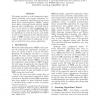Free Online Productivity Tools
i2Speak
i2Symbol
i2OCR
iTex2Img
iWeb2Print
iWeb2Shot
i2Type
iPdf2Split
iPdf2Merge
i2Bopomofo
i2Arabic
i2Style
i2Image
i2PDF
iLatex2Rtf
Sci2ools
109
click to vote
CORR
2000
Springer
2000
Springer
A Comparison between Supervised Learning Algorithms for Word Sense Disambiguation
This paper describes a set of comparative experiments, including cross{corpus evaluation, between ve alternative algorithms for supervised Word Sense Disambiguation (WSD), namely Naive Bayes, Exemplar-based learning, SNoW, Decision Lists, and Boosting. Two main conclusions can be drawn: 1) The LazyBoosting algorithm outperforms the other four state-of-theart algorithms in terms of accuracy and ability to tune to new domains 2) The domain dependence of WSD systems seems very strong and suggests that some kind of adaptation or tuning is required for cross{corpus application.
Related Content
| Added | 17 Dec 2010 |
| Updated | 17 Dec 2010 |
| Type | Journal |
| Year | 2000 |
| Where | CORR |
| Authors | Gerard Escudero, Lluís Màrquez, German Rigau |
Comments (0)

